朗文国际英文2 UNIT8讲解
九年级英语Unit 8 Merry Christmas人教版(朗文)知识精讲
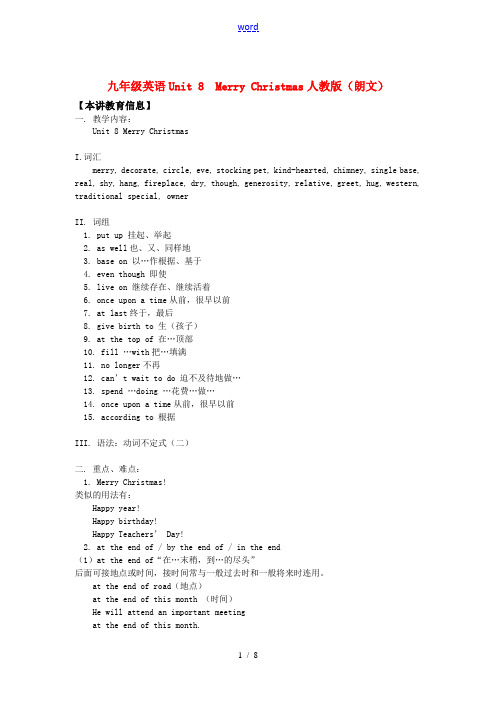
九年级英语Unit 8 Merry Christmas人教版(朗文)【本讲教育信息】一. 教学内容:Unit 8 Merry ChristmasI.词汇merry, decorate, circle, eve, stocking pet, kind-hearted, chimney, single base, real, shy, hang, fireplace, dry, though, generosity, relative, greet, hug, western, traditional special, ownerII. 词组1. put up 挂起、举起2. as well也、又、同样地3. base on 以…作根据、基于4. even though 即使5. live on 继续存在、继续活着6. once upon a time从前,很早以前7. at last终于,最后8. give birth to 生(孩子)9. at the top of 在…顶部10. fill …with把…填满11. no longer不再12. can’t wait to do 迫不及待地做…13. spend …doing …花费…做…14. once upon a time从前,很早以前15. according to 根据III. 语法:动词不定式(二)二. 重点、难点:1. Merry Christmas!类似的用法有:Happy year!Happy birthday!Happy Teachers’ Day!2. at the end of / by the end of / in the end(1)at the end of“在…末稍,到…的尽头”后面可接地点或时间,接时间常与一般过去时和一般将来时连用。
at the end of road(地点)at the end of this month (时间)He will attend an important meetingat the end of this month.They had a tea party at the end of last year.(2)by the end of:某一点时间以前,到或一点时间为止,谓语动词一般是表示状态的动词,多与完成时连用。
朗文国际英语教程第二册 Unit.ppt

一般疑问句:was/were+ 主语 +现在分词
Were you playing basketball at four yesterday afternoon?
Yes, I was./ No, I wasn’t.
1.I was singing songs yesterday morning. 否定句: _________________________ 一般疑问句:_ቤተ መጻሕፍቲ ባይዱ_______________________
scary movies(恐怖电影) nightmares(恶梦) stay up late(熬夜) oversleep(睡过头) account (账户) evict(驱逐) accident (事故) probably(可能) sore throat
assembler(装配工) designer(设计师)welder (焊接工) director(导演) gardener (园丁) inspector(检查员) photographer (摄影师) programmer(程序员) supervisor(监督员)
Unit 9
Past Continuous Tense
( 过去进行时)
Past Continuous Tense(过去进行时):表 示在过去某一时间内正在进行的动作或某段 时间内一直进行的动作。
过去进行时的标志词:at 8 o’clock last night, this time yesterday、this morning、the whole morning、 all day yesterday、 from
telephone rang. 否定句: ________________________ 一般疑问句:__________________________
朗文国际英语教程2(sidebyside2)unit2SBS2Unit2

Mayonnaise is a thick pale sauce made from egg yolks and oil. It is put on salad.
Think about it :
Which one we can add ‘s’ or ‘es’ ?
Which one we can’t add ‘s’ or ‘es’ ?
but I have (a little/a few) homework to do.
Please open your books, turn to P14 Let’s practice
delicious excellent fantastic
very good wonderful
Let’s practice
Countable uncountable
nouns
nouns
apples bananas carrots eggs grapes lemons onions oranges pears potatoes tomatoes
cheese chicken fish ketchup lettuce mayonnaise meat mustard pepper salt soy sauce
SBS2- Unit 2
1. 长大
2上高中 3 上大学
4 住在
5给对方写信
6.送她一些CD 7送他钱包
8借给
9给他建议
10失业
2
1多年以来 3度假
2去教堂
4虽然
5很远
6互相交流 7给他们发信息
8我们送他们9互相帮助 Nhomakorabea10借他们钱 11给我们建议
12卖掉房子
13搬进
朗文英语听说教程2

朗⽂英语听说教程2朗⽂英语听说教程(⼆)QuizUnit 1 What’s in a Name?1. a. They name them after grandparents.b. They choose names they like.c. They choose names of family friends.2. a. Boys’ namesb. Girls’ namesc. Boys’ and girls’ names3. a. Place namesb. Occupational namesc. Added names4. a. Place namesb. Added namesc. Occupational names5. Describe three ways parents choose first names for their children.6. What is the origin of the name Smith? Why does the name Smith exist in so many languages?Answer Key1. b2. a3. a4. b5. Some parents name their children after friends or family members who have died recently. Other parents pass down names from generation to generation. Others choose names because they like how they sound.6. The name Smith comes from the English word “smite,” to strike. A smith made metal tools and other things people needed for daily life. Many languages have names that mean smith because every town had a smith.Unit 2 English: A Global Language?1. a. English is not a global language.b. English is a global language.c. English is the official language.2. a. Many taxi drivers prefer English to Italian.b. Many people speak English fluently.c. Many people use English for their jobs.3. a. New Yorke rs don’t always speak English.b. New Yorkers need English for everyday purposes.c. New Yorkers need English to be successful.4. a. People need a common language for specialsituations.b. People are becoming more fluent in English.c. Pilots should be fluent in several languages.5. Give three examples to support the view that English is a global language.6. Give three examples to support the view that English is not a global language.Answer Key1. b2. c3. a4. a5. First, English is the main language of science and business. Second, many people study English because they need it for their daily lives. Third, English is used as a common language for international sporting events and meetings.6. First, many people do not use English for daily communications. Second, many people use English only for specialized job situations but don’t speak it fluently. Third, many people don’t speak English even in countries where English is the official language.Unit 3 High Anxiety: Phobias1. a. Mildb. Extremec. Normal2. a. Phobias are uncomfortable.b. Phobias are common.c. Phobias are learned.3. a. By what people fearb. By how people reactc. By the problem they cause4. a. Phobias are the problems themselves.b. Phobias are signs for deeper problems.c. Phobias are quite easy to control.5. Explain the two theories of what causes phobias. Give examples.6. How would followers of each theory differ in their treatment of patients?Answer Key1. b2. c3. a4. d5. The first theory is that a phobia is learned. For example, a woman who was bitten by a dog feels afraid whenever she seesa dog. The second theory is that a phobia is a sign of a deeper problem. For example, a man is afraid of the dark because he’s really afraid of his father, who used to make him sit in a dark room.6. Followers of both theories try to help patients change their behavior. Followers of the second theory also try to identify the patients’ deeper problems.Unit 4 TV: What We Watch1. a. It influences our work.b. It influences our clothes.c. It influences our literature.2. a. People like the universal themes.b. People are interested in culture.c. People everywhere have TVs.3. a. They identify with the characters.b. They have a lot of free time.c. They like the advertising.4. a. Create a continuing storyb. Create funny charactersc. Create character loyalty5. What does character loyalty mean? Give an example.6. If you were writing a soap opera, what themes would you include? Why?Answer Key1. b2. a3. a4. c5. Character loyalty means that viewers become very attached to the characters. They think of them as friends. For example, in the TV show “Seinfeld,” viewers get to know the main characters (Jerry, Elaine, George, and Kramer) and look forward to spending time with them.6. I would include themes such as family, love, personal struggles, money problems, marriage problems, job problems, and health problems. These are universal themes that appeal to everybody.Unit 5 Learning Differently1. a. Dyslexic students need special schools.b. Dyslexic students need teachers who can beflexible.c. Dyslexic students shouldn’t attend school.2. a. Dyslexia may cause problems at school.b. Dyslexia may be hard to treat.c. Dyslexia may be an inherited condition.3. a. They generally score well on intelligence test.b. They generally appear intelligent to their teachers.c. They generally follow directions well.4. a. To help students do better at schoolb. To build special schools for dyslexic studentsc. To use computer chips to help dyslexic children5. Summarize Dr. Levinson’s ideas on how the brain is like a TV set.6. What kind of teacher should be helpful for students with dyslexia?Answer Key1. b2. c3. a4. a5. Dr. Levinson thinks the brain is like a TV set because they both have many channels. People receive signals about what they see and hear. If the signal drift, people can’t tune in to the cor rect channels and don’t process information correctly.6. A teacher that would be helpful for students with dyslexia would be flexible about how to teach different subjects. The teacher would also understand the problems dyslexic children face. In addition, the teacher would try to help the students feel better about themselves.Unit 6 Immigration: Bound for the United States1. a. A permanent move to another countryb. A temporary move to another countryc. A forced move to another country2. a. Most immigrants were from Spain or France.b. Everyone was allowed to immigrate to the UnitedStates.c. Most immigrants was not voluntary.3. a. The industrial revolution in Europeb. Families and friends in the United Statesc. Jobs on farms in California4. a. Why the immigrants came to the United Statesb. What work the immigrants didc. Where the immigrants came from5. Why was the Naturalization Act of 1798 important?6. Why was the United States called a melting pot? What has replaced the idea of a melting pot?Answer Key1. a2. b3. a4. c5. The Naturalization Act of 1798 allowed government to control immigration. The act required immigrants to live in the United States for a certain number of years before they became citizens.6. The United States was called a “melting pot” because people thought immigrants should give up their traditions to create a uniform society. This was replaced with the idea of a “mixed salad.” The idea is that immigrants keep their traditions and mix together to create a strong society.Unit 7 Who’s Calling the Shots?1. a. A good manager always works very hard.b. A good manager rewards employees for theirwork.c. A good manager tells employees what to do.2. a. To give the employees a break from the officeb. To make the employees like the new managerc. To help the employees work better together3. a. So the employees understand that management isin control.b. So the employees know that management valuestheir ideas.c. So the employees understand why changes areoccurring4. a. Employee relations is important.b. Managers can make mistakes.c. Management styles often vary.5. Why has team-building become important for managers?6. Describe the three parts of Mrs. Gomez’steam-building plan.Answer Key1. b2. c3. b4. a5. Managers now realize that employees like to feel like they are part of a team. If employees think their ideas are valued and their skills are important to the company, they will do their best work.6. First, Mrs. Gomez met with the employees to discuss the new office organization. Then, she had the employees write answers to questions about the new office organization. Finally, she planned a fun activity so they could get to know each other.Unit 8 Right and Wrong on the Net1. a. To provide guidelines for ethical computer useb. To increase the use of computers in schoolsc. To solve computer problems caused by hacking2. a. Reading a friend’s e-mailb. Using a friend’s screen namec. Downloading free software3. a. Students should use the Internet ethically.b. Students should stop using the Internet.c. Students should enforce computer ethics rules.4. a. Government laws about computer useb. School rules about computer usec. Student-made guidelines about computer use5. What is the purpose of the Ten Commandments of Computer Ethics? What are the main principles behind them?6. Explain one of the Ten Commandments of Computer Ethics. Give an example.Answer Key1. a2. c3. a4. b5. The purpose of the Ten Commandments of Computer Ethics is to provide guidelines for ethical use of computers. The main principles behind them are that people should respect other people’s property and use resources fairly.6. According to one commandment, you should not appropriate other people’s ideas. This means you shouldn’t pretend someone else’s ideas are yours. For example, it is not ethical to download a term paper from the Internet and pretend you have written it.Unit 9 Which Way Will It Go?1. a. Global weather changesb. The loss of productive landc. Overgrazing of farm animals2. a. To emphasize that land is very expensiveb. To emphasize that people live on every continentc. To emphasize that the problem will get worse3. a. A quarterb. A thirdc. Half4. a. Fewer plants grow.b. Less rain falls.c. Fewer animals graze.5. What are the main causes of productive land loss?6. How are organizations helping countries deal with productive land loss? Give an example.Answer Key1. b2. c3. b4. a5. The main causes of productive land loss are people’s actions. These actions include overgrazing of animals, overcutting of trees, and traditional farming methods that no longer work well.6. Organizations are trying to help countries find solutions to productive land loss. They look at both traditional methods and modern methods that respect the local culture. For example, they may suggest new irrigation systems that leave less salt in the soil.Unit 10 It’s in the DNA1. a. The existence of genesb. The complete set of human genesc. The structure of DNA2. a. Because everyone has a unique DNA sampleb. Because everyone has different health problemsc. Because everyone reacts to medicine differently3. a. Defects in these genes cause the diseases.b. Defects in these genes may cause the diseases.c. Defects in these genes prevent the diseases.4. a. It increases drug sales.b. It saves lives and money.c. It prevents genetic defects.5. How is a DNA fingerprint made? Explain the steps.6. How could employers or insurance companies use DNA testing against people?Answer Key1. c2. a3. b4. b5. DNA testing can be used to help someone in prison in the following way. A DNA sample can be taken from the prisoner. Testing is then done. If the DNA does not match the DNA from the evidence at the crime scene, this can be used to prove that the person in prison did not commit the crime.6. Employers could use the information from DNA testing to deny people jobs or fire them if they’re at higher risk for serious diseases. Insurance companies could use the information to deny people insurance or charge them higher rates.Unit 11 Staying Healthy1. a. People have weaker immune systems.b. People are traveling more internationally.c. Environmental problems are increasing.2. a. We need to be careful in international airports.b. Travel to Europe can cause problems.c. We need to be aware of risks and take precautions.3. a. Fight diseases where we liveb. Travel to other countriesc. Develop treatments4. a. It helps to increase immunity.b. It makes the immune system work overtime.c. It helps treat some diseases.5. What is adaptive immunity? Give an example.6. How are allergies and diseases related?Answer Key1. b2. c3. a4. a5. “Adaptive immunity” means people build up resistance to the germs where they live. As a result, they are not affected by them. For example, someone living in Tokyo has adaptive immunity to the germs in Tokyo, but not to the germs in Paris.6. Allergies and diseases are both based on our immune responses. With allergies, the immune system is working too hard. With diseases, w e aren’t able to resist the cause of the disease.Unit 12 Prepare, Prepare1. a. Property damageb. Disruption of normal lifec. Loss of ocean life2. a. To prevent natural disastersb. To prepare for natural disastersc. To predict natural disasters3. a. Researching and planningb. Recovering and rebuildingc. Organizing emergency supplies4. a. Researching and planningb. Recovering and rebuildingc. Organizing emergency supplies5. What is the difference between a natural hazard anda natural disaster?6. Why is it difficult for some countries to initiate an emergency response plan?Answer Key1. c2. b3. a4. c5. A natural hazard is a force in nature that can be dangerous. Examples include hurricanes, typhoons, and earthquakes. A natural disease is a force in nature that has caused a lot of damage. An example is a serious earthquake that causes death and property loss.6. To initiate an emergency response plan, a country needs scientific information, money, and cooperation between scientists and the government. Many countries don’t have scientific information or the money to use it. Also, governments may not warn people about a disaster because they’re not sure it will occur.朗⽂英语听说教程(⼀)QuizUnit 2 New Kinds of Food (1’:50”)1. a. Fresh foodb. Dangerous foodc. Altered food2. a. Strawberriesb. Applesc. Bananas3. a. It needs fewer pesticides.b. It grows in less space.c. It dominates the environment.4. a. It may stay fresh longer.b. It may be more expensive.c. It may be harmful to people.5. What are three benefits of genetically modified food?6. What are three risks of genetically modified food?Answer Key1. c2. a3. a4. c5. Genetically modified food needs fewer pesticides. Genetically modified food/plants grow better than normal. In addition,they stay fresh longer after they are harvested.6. Genetically modified food/plants may dominate other plants in the environment. Also, they might hurt wild animals and insects. They might even hurt the people who eat them.Unit 3 Public Art (2’:02”)1. a. Art in museumsb. Art in people’s housesc. Art in public places2. a. Spoonbridge and Cherry (spoon and cherry)b. Non-Violence (gun in knot)c. Peace (woman on horse)3. a. Public artb. Surrealismc. Peace4. a. To make people go to museumsb. To make artists more popularc. To make public places more beautiful5. What is pop art? Give an example.6. What is surrealistic art? Give an example.Answer Key1. c2. c3. c4. c5. Pop art shows things people see in their everyday lives. Spoonbridge and Cherry, the sculpture of a large spoon with a cherry, is an example of pop art.6. Surrealistic art shows things that are strange or impossible. Non-Violence, the sculpture of a gun tied in a knot, is an example of surrealistic art.Unit 5 Violence on Television (2’:11”)1. a. Three to four hours a dayb. Three to four hours a weekc. Thirty to forty hours a week2. a. Moviesb. Cartoonsc. The news3. a. About 1,000b. About 10,000c. About 100,0004. a. TV violence is linked to real violence.b. TV violence is not harmful for children.c. TV violence is increasing in the United States.5. How did researchers study the immediate effects of TV violence on children?6. How did researchers study the long-term of TV violence on children?Answer Key1. a2. b3. c4. a5. The researchers showed children a TV show of a child hitting and kicking a doll. Then they left the children alone with a doll. The children hit and kicked the doll. This study showed that children do what they see on TV.6. The researchers studied how much violent television some children watched at age eight. Then they studied the same children at age eighteen. The children who watched a lot of violence TV were more violent at age eighteen.Unit 6 Too Old to Learn? (2’:06”)1. a. Before the critical periodb. During the critical periodc. After the critical period2. a. Seeb. Eatc. Meow3. a. Seeb. Eatc. Sing4. a. The ability to hear soundsb. The ability to pronounce soundsc. The size of the brain5. Define critical period. Give an example.6. What is difficult for adult language learners? Why?Answer Key1. b2. a3. c4. b5. The critical period is when an animal or human can learn a new skill. For example, in humans there is a critical period for language learning.6. Adults find it difficult to pronounce sounds correctly. Therefore, they may never learn to speak a new language with anative accent.Unit 7 Are We Alone? (2’:15”)1. a. Intelligent beingsb. Other galaxiesc. Rocket ships2. a. They have received signals from other planets.b. They have seen rockets from other planets.c. They believe other planets could support life.3. a. By sending out radio signalsb. By listening for radio signalsc. By sending out rockets4. a. Radio signals travel quickly and have a short range.b. Radio signals travel quickly and have a long range.c. Radio signals travel slowly and have a long range.5. How fast do radio signals travel? How long is needed for a radio signal to travel from the nearest galaxy to earth?6. Why doesn’t the SE TI project use rockets to look for intelligent life?Answer Key1. a2. c3. b4. b5. Radio signals travel at the speed of light. A radio signal travels about four years from the nearest galaxy to earth.6. Rocket ships are restricted to traveling in one direction. And they are much slower than radio signals.Unit 8 Do the Right Thing (1’:55”)1. a. Do what is best for most people.b. Do what is best for everybody.c. Do what is best for yourself.2. a. Take care of other people.b. Do what is best for yourself.c. Make your own decisions.3. a. Aristotleb. Kantc. Bentham4. a. The principle of individual rightsb. The principle of individual goodc. The principle of common good5. Explain why the friend in the lecture wanted to lie to the dying woman.6. Use an ethical principle to explain how the friend can justify lying to the dying woman.Answer Key1. a2. c3. b4. c5. The friend thought spending a lot of money on an expensive funeral was a waste of money. He wanted to give the money to a school for homeless children.6. Following the principle of common good, the friend will help more people if he gives the money to the school for homeless children. The only person he might hurt is the dying woman.。
香港朗文2A各单元知识要点
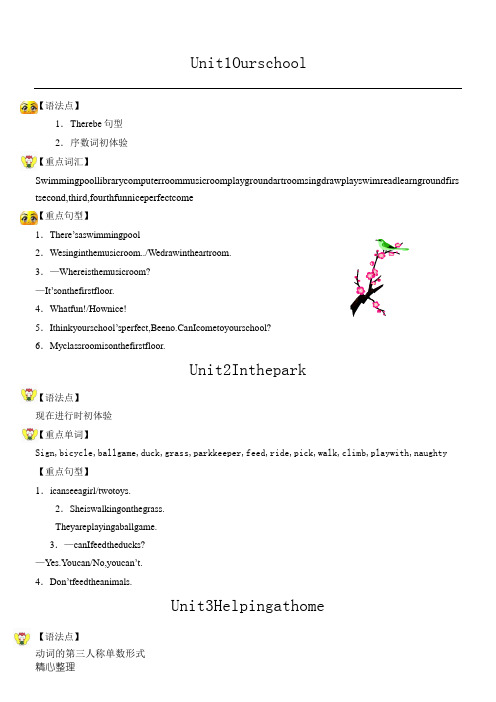
【语法点】
1.Therebe句型
2. 序数词初体验
【重点词汇】
Swimmingpoollibrarycomputerroommusicroomplaygroundartroomsingdrawplayswimreadlearngroundfirstsecond,third,fourthfunniceperfectcome
Unit8Lookingafterapet
【语法点】
否定句
【重点单词】
Meat,fish,rice,bones,worms,milkthin,fat,doesn’t
【重点句型】
1.——Whatdocatseat?
——Theyeatfishandrice.
2.—Whatdon’tcatslike?
——catsdon’tlikeworms.
6.Myclassroomisonthefirstfloor.
Unit2Inthepark
【语法点】
现在进行时初体验
【重点单词】
Sign,bicycle,ballgame,duck,grass,parkkeeper,feed,ride,pick,walk,climb,playwith,naughty
2.—Thisismypen.Whosetieisthis?
—It’smytie.
3.IwanttowatchTV.
4.—Icanfeelsomethingsoft.Whoseteddybearisthis?
—It’smyteddybear.
5.Icanfeelsomethingcoldandwet.Ohdear!It’stheiricecream.
6.Tellmeaboutyourclassroom.
(2021年整理)深圳朗文小学英语知识点1-7册
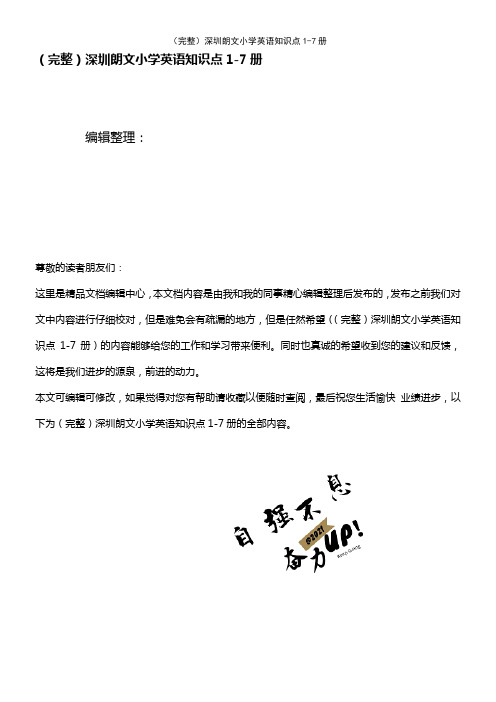
(完整)深圳朗文小学英语知识点1-7册编辑整理:尊敬的读者朋友们:这里是精品文档编辑中心,本文档内容是由我和我的同事精心编辑整理后发布的,发布之前我们对文中内容进行仔细校对,但是难免会有疏漏的地方,但是任然希望((完整)深圳朗文小学英语知识点1-7册)的内容能够给您的工作和学习带来便利。
同时也真诚的希望收到您的建议和反馈,这将是我们进步的源泉,前进的动力。
本文可编辑可修改,如果觉得对您有帮助请收藏以便随时查阅,最后祝您生活愉快业绩进步,以下为(完整)深圳朗文小学英语知识点1-7册的全部内容。
小学英语第一册Unit 1 saying helloHello!Good morning .How are you ! -—-—Fine, thank you 。
Goodbye.Thank you。
Unit 2 Making friendsGood afternoon 。
Hello!I’m Pat. ————Hi! My name’s Bill。
What's your name ? --—-xxxUnit 3 My classroomWhat's this?—-——It’s a chair/fan/computer/desk/book/girl/king/queen.What's this in my classroom ?————It's xxx。
Sorry。
Unit 4 My school thingsWhat’s this ? It’s my .。
.This is my bag/ruler/rubber/pen/pencil/pencil case.Unit 5 RevisionUnit 6 playing a gamePoint to the board.Look at the window。
Sit down。
Open your books。
Close your books.Stand up.You're out.Unit 7 My bodyears eyes a nose/mouth fingerDraw 。
朗文BACKPACK少儿英语LEVEL2 UNIT8

Unit 8 FUN AT THE ZOOScriptJULIA: Hello!It¡¯s time for Backpack!Today,our show is about the zoo! Let¡¯s start with a great song about the zoo!Listen!SONGWhat do you want to do today,and see today at the zoo? I want to see the elephants,giraffes and tigers, too! What do you want to do today,and see today at the zoo?I want to see the kangaroos,lions and monkeys,too!What do you want to do today, and see today at the zoo?I want to see the crocodiles,zebras and peacocks, too!JULIA: This is a kangaroo.And this kangaroo lives at the zoo.Zoos are fun!Hey,here¡¯s story about zoo animals!Let¡¯s watch!.DOCUMENTARYJULIA: Zoos are fun places.These boys and girls are visiting the zoo.What are they looking at? Lets¡¯ see.Look at the water.Do you see the fish?The boys and girls are looking at the fish. Fish live in the water.And fish swim in the water.These fish are big.They¡¯re white and orange. What¡¯s your favourite animal? Is it a zebra?Zebras are black and white.Is it a giraffe?They¡¯re very tall.They have long necks.And they eat leaves from the trees.Is it a monkey?Monkeys are fun animals.Some monkeys are brown.Some monkeys are black. And some monkeys are white.They have long arms.And monkeys can climb trees.Monkeys can swing in the trees,too.Now,what¡¯s your favourite animal?。
朗文国际英语教程2(side by side2)unit3 SBS2 Unit 3
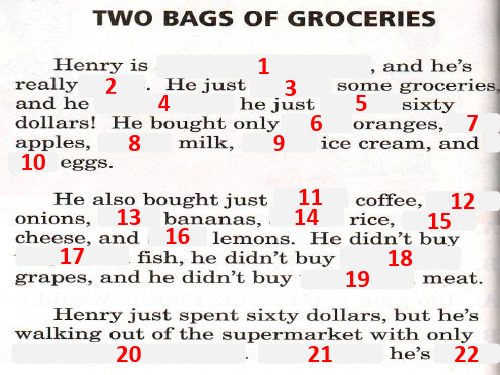
1. d_l_c_ _ _s 美味的
2. _ _c_l_ _nt 极好的 3. f_nt_ _t_c 极好的 4. m_g_ _f_cent 宏伟的 5. w_ _d_ _ful 令人惊奇的
1.anniversary 2.dinner 3. order
4. enjoy
5. wonderful
1. a can of soup 一罐… 2. a jar of jam 一瓶…(广口瓶) 3. a bottle of ketchup 一瓶(小口瓶) 4. a box of cereal 一盒… 5. a bag of flour 一包… 6. a loaf of white bread 一条… 7. two loaves of whole wheat bread 两条… 8. a bunch of bananas 一串、一束… 9. a head of lettuce 一颗、一头… 10. a dozen eggs 一打…(12个) 11. a pint of ice cream 一品脱… 12. a quart of orange juice 一夸脱… 13. a gallon of milk 一加仑… 14. a pound of meat 一磅… 15. a half pound / half a pound of cheese 半磅…
2
10
1 4
3 9 6 11 14
5
8
13 17
7
12 15
16
19
20 21
18
22
SBS2- Unit 3
1. soup
2. jam
3. ketchup
4. cereal
5. flour
6. white bread 7. whole wheat bread 10. eggs
朗文国际英语教程SBS1-Gazette after unit 8
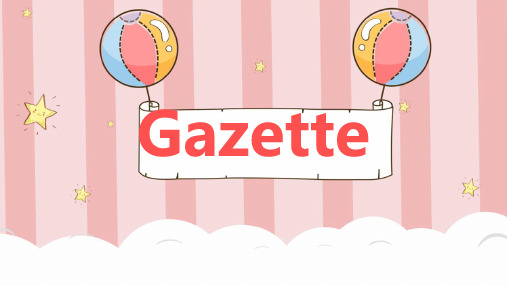
What are they saying?
Color and flag
Today's flag features five stars in the left-hand corner — one large star surrounded by four smaller stars — on a red background.
Color and flag
Clothing, Color, and Cultures
True or false
1 Blue is a color for boys all around the world. 2 In some countries, pink is a color for girls. 3 White is a color for wedding dresses all around the world. 4 Red is a lucky color in all cultures.
Color and the meanings
White: wedding dress, snow Green: Red: Yellow: blue:
Color and flag
USA Flag The flag of the United States, known as Old Glory, consists of thirteen horizontal red and white stripes and fifty white stars in a blue rectangle in the top left corner. The current American flag design was adopted on July 4, 1960.
朗文国际英语教程2(side-by-side2)unit6-SBS2-Unit-6

无论如何还是谢谢你
1. 固执的 2. 有耐性的 3. 懒的 4. 粗鲁的 5. 吵的 6. 大方的 7. 流行的,受欢迎的 8. 有耐心的 9. 精力充沛的 10.讨人厌的 11.脏乱的 12.乐于助人的 13.诚实的
1. 乐于助人的 2. 诚实的 3. 有耐性的 4. 懒的 5. 粗鲁的 6. 流行的, 7. 精力充沛的 8. 讨人厌的 9. 脏乱的 10.固执的 11.受欢迎的 12.有耐心的 13.大方的
1. big _b_i_g_g_e__r__ _t_h_e__b_i_g_g_est
2. funny _f_u_n__n_i_e_r_ _th__e_f_u_n__n_iest 3. close _c__lo_s__e_r__ _th__e_c__lo_s__est 4. friendly _f_ri_e_n_d__li_e_r th__e_f_r_ie__n_d_liest 5. comfortable _m_o__r_e_c_o__m__fo__rt_a_ble
1. even though = even if 即使 2. product 产品 3. furniture 家具 4. appliance 器具、器械、装置 5. dependable 可靠的 6. entertainment 娱乐 7. besides 除了…之外 beside在…旁边 8. location 位置、场所 9. convenient 方便的 10. salesperson 销售员 11. In addition, … 另外…
This cow is the shortest in the world.
世界最高男子土耳其 人苏丹·考森 (SultanKosen),2009年 2月11日测量时身高为2.46 米,他的生日是1982年12 月10日。
朗文国际英语教程2(side by side2)unit7 SBS2 Unit 7
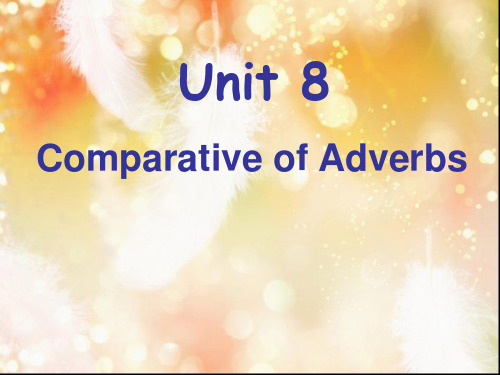
How are you going to get to school tomorrow?
If it rains, I’ll take the bus. If it’s sunny, I’ll walk.
Where’s Rosa going to have for dinner tonight?
If she’s very hungry, she’ll have a big dinner. If she isn’t very hungry, she’ll have a sandwich.
funny interesting
elegant beautiful
hard-working
fast
friendly
helpful
big
comfortable
boring
How to use an adjective? adj. + n.
a big airport
a comfortable motel
e.g. heavy—heavily
happy—happily careful—carefully beautiful—beautifully clear—clearly bad—badly loud—loudly true—truly lucky—luckily quick—quickly
某些以-ly结尾的词不是副词而是形容词。
常用副词比较级与最高级的构成: 规则变化:
单音节词: 比较级词尾+ er ; 最高级词尾+ est e.g. far → farther → farthest 双音节和多音节词: 比较级: 词前+more;最高级: 词前+most; e.g. slowly→ more slowly→ most slowly easily→ more easily→ most easily
朗文英语听说教程二听力原文_Unit_08
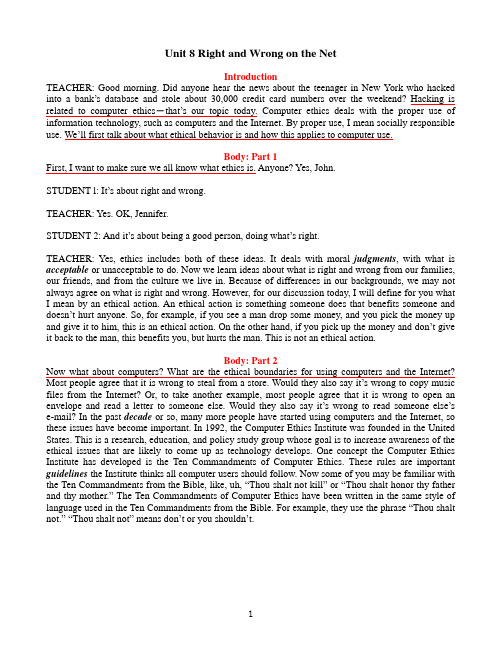
Unit 8 Right and Wrong on the NetIntroductionTEACHER: Good morning. Did anyone hear the news about the teenager in New York who hacked into a bank’s database and stole about 30,000 credit card numbers over the weekend? Hacking is related to computer ethics-that’s our topic today. Computer ethics deals with the proper use of information technology, such as computers and the Internet. By proper use, I mean socially responsible use. We’ll first talk about what ethical behavior is and how this applies to computer use.Body: Part 1First, I want to make sure we all know what ethics is. Anyone? Yes, John.STUDENT l: It’s about right and wrong.TEACHER: Yes. OK, Jennifer.STUDENT 2: And it’s about being a good person, doing what’s right.TEACHER: Yes, ethics includes both of these ideas. It deals with moral judgments, with what is acceptable or unacceptable to do. Now we learn ideas about what is right and wrong from our families, our friends, and from the culture we live in. Because of differences in our backgrounds, we may not always agree on what is right and wrong. However, for our discussion today, I will define for you what I mean by an ethical action. An ethical action is something someone does that benefits someone and doesn’t hurt anyone. So, for example, if you see a man drop some money, and you pick the money up and give it to him, this is an ethical action. On the other hand, if you pick up the money and don’t give it back to the man, this benefits you, but hurts the man. This is not an ethical action.Body: Part 2Now what about computers? What are the ethical boundaries for using computers and the Internet? Most people agree that it is wrong to steal from a store. Would they also say it’s wrong to copy music files from the Internet? Or, to take another example, most people agree that it is wrong to open an envelope and read a letter to someone else. Would they also say it’s wrong to read someone else’s e-mail? In the past decade or so, many more people have started using computers and the Internet, so these issues have become important. In 1992, the Computer Ethics Institute was founded in the United States. This is a research, education, and policy study group whose goal is to increase awareness of the ethical issues that are likely to come up as technology develops. One concept the Computer Ethics Institute has developed is the Ten Commandments of Computer Ethics. These rules are important guidelines the Institute thinks all computer users should follow. Now some of you may be familiar with the Ten Commandments from the Bible, like, uh, “Thou shalt not kill” or “Thou shalt honor thy father and thy mother.” The Ten Commandments of Computer Ethics have been written in the same style of language used in the Ten Commandments from the Bible. For example, they use the phrase “Thou shalt not.” “Thou shalt not” means don’t or you shouldn’t.Body: Part 3Let’s look at each commandment or rule. The first commandment says: Thou shalt not use a computer to harm other people. Simple enough, right? Number Two. Thou shalt not interfere with other people’s computer work. I interpret this to mean don’t use a computer in any way that will affect or change the work someone else is doing. Don’t move or edit someone else’s files without telling them. Number Three. Thou shalt not snoop in other people’s files. To snoop means to try to find out something without another person knowing it. If you look at someone else’s files on the computer or read their e-mail, you’re snooping. Respect other people’s privacy. Number Four. Thou shalt not use a computer to steal. There are situations on the Internet in which you have to decide if you are stealing or not, like downloading music files, as I mentioned earlier. Number Five. Thou shalt not use a computer to say things that are untrue. It is up to you to be truthful in your website, in your e-business, and in your e-mail. Number Six. Thou shalt not use software for which you have not paid. In other words, if the software is free on the Internet, it’s okay to download and use it. However, it is not okay to copy software from a friend, because you didn’t pay for it. Number Seven. Thou shalt not use other people’s computer resources without telling them, or without paying them. For example, you shouldn’t use someone else’s computer, password, or Internet connection without asking them first. Number Eight. Thou shalt not appropriate someone else’s ideas. Appropriate is spelled A-P-P-R-O-P-R-I-A-T-E. . . . It means to take words someone else wrote and say they’re yours. Uh, for example, you have to write a report for school. If you copy a term paper from the Internet and hand it in, you’re breaking the rule. Copying even a few sentences off the Internet and presenting them as your own is breaking the rule. Number Nine. The ninth commandment says: Thou shalt think about the social consequences of the program you are writing. Now, this applies mostly to computer programmers. Social consequences means how the program you’re writing might affect others in society. Could hackers possibly use your program to illegally gain access to a computer system? Skillful hackers can hack into banks and into credit card companies; they can alter accounts and steal money. They can also create viruses that can cause billions of dollars of damage worldwide. Number Ten. The tenth commandment says: Thou shalt always use a computer in ways that are respectful of others. For example, sending unfriendly e-mail to someone or about someone or creating websites with negative messages are examples of breaking this rule.Body: Part 4OK, the Computer Ethics Institute has sent these guidelines to many large companies and to schools across the United States. However, there’s no way to enforce these rules. Nevertheless, they would like to see schools, in particular, utilize these rules to help students develop a strong sense of computer ethics. OK, any questions or comments at this point?STUDENT 1: How are we supposed to remember all those rules?TEACHER: Well, there are a lot of rules, but they all boil down to a couple of principles: respect and fairness. Respect what belongs to others and use resources fairly. Does that help?STUDENT 1: Yeah, I guess so.TEACHER: Good. Let’s go back to ethics. Now increasingly, schools are seeing that students need to be taught computer ethics as part of the school curriculum. Some schools have come up with acceptable-use policies, or rules about what is or isn’t OK for students to do regarding computer use. This is how the Computer Ethics Institute would like to see schools utilizing the rules. Generally, it’s considered wrong to steal someone else’s password or to read someone else’s e-mail. It’s also considered unacceptable in college classes for a student to download a term paper off the Internet and pretend that he or she wrote it. This is called “plagiarism,” and it’s a good example of breaking rule number eight. Students are permitted to use the Internet for research, but are instructed to write the information in their own words and to explain where they got the information.ConclusionNow the ten rules are guidelines for us to follow. These rules help us to be aware of the ethical uses of technology. Let’s stop here for today. Think about these rules this week and we’ll talk about them. And read the next two chapters for next week.。
朗文少儿英语第二册小故事集锦
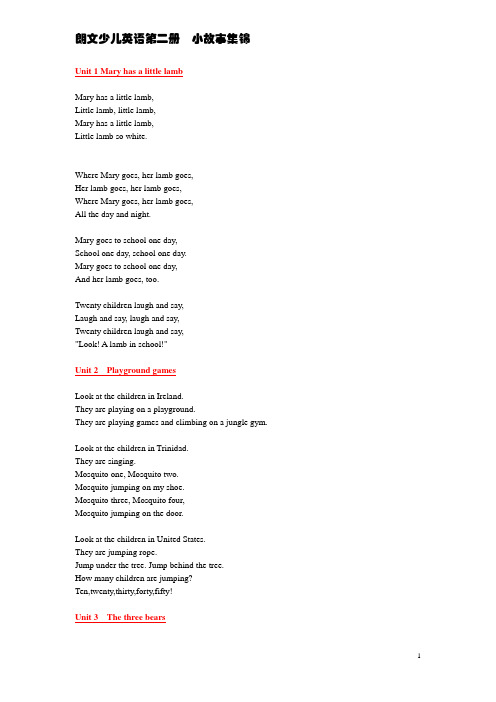
朗文少儿英语第二册小故事集锦Unit 1 Mary has a little lambMary has a little lamb,Little lamb, little lamb,Mary has a little lamb,Little lamb so white.Where Mary goes, her lamb goes,Her lamb goes, her lamb goes,Where Mary goes, her lamb goes,All the day and night.Mary goes to school one day,School one day, school one day.Mary goes to school one day,And her lamb goes, too.Twenty children laugh and say,Laugh and say, laugh and say,Twenty children laugh and say,"Look! A lamb in school!"Unit 2 Playground gamesLook at the children in Ireland.They are playing on a playground.They are playing games and climbing on a jungle gym.Look at the children in Trinidad.They are singing.Mosquito one, Mosquito two.Mosquito jumping on my shoe.Mosquito three, Mosquito four,Mosquito jumping on the door.Look at the children in United States.They are jumping rope.Jump under the tree. Jump behind the tree.How many children are jumping?Ten,twenty,thirty,forty,fifty!Unit 3 The three bearsFather, Mother, and Baby Bear are in the kitchen. Mother Bear puts milk on the table.“It’s too hot,” says Baby Bear.So they go out for a walk.A little girl walks into the kitchen.She sees three cups of milk.She picks up the little cup.“This milk is for me,” she says.And she drinks it.Then she walks into the bedroom.She sees three beds.She climbs into the little bed.“This bed is for me!” she says.And she goes to sleep.The bears walk in the house.“There’s a little girl in our bedroom!” says F ather Bear. Unit 4 School tripI live in Monterrey.It is a big city in Mexico.Today we're going on a school trip.We are looking at the buildings in our city.We ride the Metro to the post office.It is next to the police station.We are walking on the street.We see a fire truck in the fire station!"Hello, firefighter!" we say.It is the end of our trip.We get ice cream cones and eat at the park."Where can we go now?" we ask.Unit 5 A singing catLee is a little boy in a little town.He has no family.He has no money.But he has a singing cat.On Saturday he goes to the market.He stands in front of a shop.His cat sings and sings.His cat sings to the mail carrier.His cat sings to the salesperson.A man on a horse stops and listens to the cat sing. He asks, "Can I have your cat?"Lee says, "You can have my cat,but I want your horse.Then I can work."Lee and the horse work and work.Lee takes food to the market.? He gets money."Now I'm happy!" says Lee.Unit 6 School day in SpainHello! My name is Teresa.I live in Spain.I get up at 8:00 in the morning.I wash my face and brush my teeth.I get dressed.Then I comb my hair.I eat breakfast.Breakfast is hot milk and cookies.We walk to school.We read and write.At 11:00 we play on the playground.At 1:00 we have a big hot lunch. Yum!Then we have school again.At 5:00 we go home and do our homework.We watch TV.At 7:001 take a bath.We eat dinner at 8:00It is soup and salad.I look out my window at the town.And then it is 10:00 — time for bed!Good night!Unit 7 Who wants a fish?Cat likes fish.She does not like cookies.She does not like apples.She does not like oranges.One day Cat sees a fish in a bowl,She jumps and she jumps.But she can't touch the fish.She is mad.Cat pushes the chair next to the table. ,She climbs on the chair.She jumps and she jumps.But she can't touch the fish.She is mad at that fish.Dog comes in the room."Do you want that fish?" asks Dog"No, no, no! Who wants a fish? Not me!"says Cat.Fish looks happy, but Cat does not.Unit 8 Lion can’t sneezeLion is not happy.The other animals in the zoo can sneeze, but he can't. The other animals say,"Lion, you can't be king. You can't sneeze."Lion is sad. He sees Little Bird. She asks,"How are you, Lion?" "I'm sad. Little Bird,"says Lion. "I can't sneeze. I can't be king.Can you help me?""You can't sneeze? I can help you.Watch this!" says Little Bird.Little Bird flies up to Lion's nose.She moves her feet. She dances and dances on his nose. She tickles and tickles his nose.And Lion sneezes—a big, big sneeze.'Thank you, Little Bird.I can sneeze.Now I can be king."Unit 9 My tooth is looseI live in Colombia with my family.This morning I touch a loose tooth.At night we eat dinner Oops!The loose tooth falls out I show it to my mother.At 9:00 I put my tooth under my pillow.I sleep and I wait for the little mouse.In the morning my tooth is not there.But I find some coins!I live in Lebanon.On my way to school todayI feel a loose tooth.Tonight at dinner we havesoup and salad.Oh, here is my loose tooth!My parents say, "Let's celebrate your tooth!We drive to the beach. I throw my tooth into the water.I ask for a gold tooth and I am happy.。
【教学设计】Module2Unit8
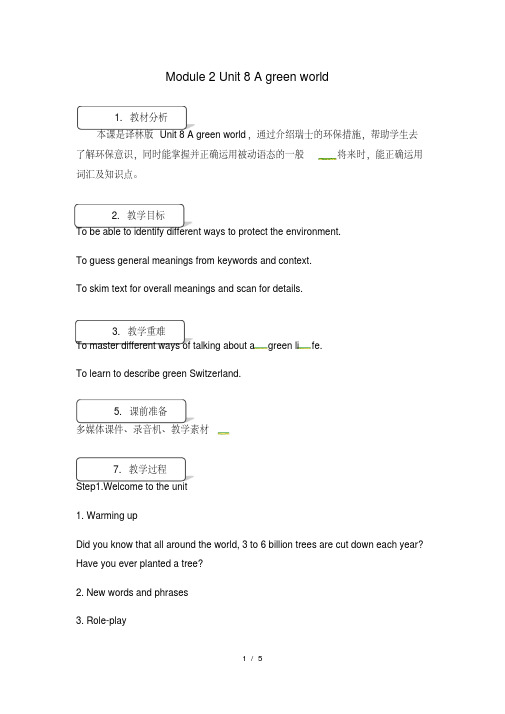
Module 2 Unit 8 A green world1.教材分析本课是译林版Unit 8 A green world,通过介绍瑞士的环保措施,帮助学生去了解环保意识,同时能掌握并正确运用被动语态的一般将来时,能正确运用词汇及知识点。
2.教学目标To be able to identify different ways to protect the environment.To guess general meanings from keywords and context.To skim text for overall meanings and scan for details.3.教学重难To master different ways of talking about a green li fe.To learn to describe green Switzerland.5.课前准备多媒体课件、录音机、教学素材7.教学过程Step1.Welcome to the unit1.Warming upDid you know that all around the world, 3 to 6 billion trees are cut down each year? Have you ever planted a tree?2.New words and phrases3.Role-play1) What is Hobo going to do?2) Will more trees be planted this year?3) What does Eddie like doing?4) What will Eddie plant?4. A green lifeThe class1, Grade 8 students are talking about ways to live a green life. Look at the pictures below and match them with the correct sentences.How to live a green life?Listen and answerPair worknguage points5.Exercises6.Have a tryStep2. Reading1.New words & phrases2.Match the words on the left with the meaning on the right.3.What do you know about this country?4.Read the article quickly and answer the question.5.Kitty made some notes of Martina’s blog on a piece of paper, but her mother tore it up by mistake. Listen to the tape and help her match the two halves of the sentences. Write the correct letters in the blanks.6.After reading Martina’s article, Kitty has wr itten down the main points of theparagraphs. Write the correct numbers of the paragraphs in the bo xes.7.Read the first paragraph carefully and answer the questions.8.Read the paragraphs 2 and 3 carefully and answe r the questions.9.Read the paragraphs 4 and 5 carefully and answer the questions.10.Kitty is telling Sandy about Martina’s article. Complete their conversation.11.Group work: How do you understand “Green Switzerland”? What’s the meaning of “green”?12.Interview: You are an interviewer. You want to interview Martina about Switzerland. Work in pairs, try to ask at lea st five questions about the country. Step3.GrammarLook at the following sentences.Fill in the blanks.被动语态的一般将来时被动语态的一般将来时的构成Practice1)The students are talking about Environment Week. Help them make sentences using passive voice.2)Lisa is telli ng her cousin Harry about a show that will be held in this Envir onment Week on the phone. Help Lisa answer Harry’s questions using the passive voice.ExerciseI. 根据句意及括号内所给动词的提示填空。
- 1、下载文档前请自行甄别文档内容的完整性,平台不提供额外的编辑、内容补充、找答案等附加服务。
- 2、"仅部分预览"的文档,不可在线预览部分如存在完整性等问题,可反馈申请退款(可完整预览的文档不适用该条件!)。
- 3、如文档侵犯您的权益,请联系客服反馈,我们会尽快为您处理(人工客服工作时间:9:00-18:30)。
条件状语从句
• 在句中作条件状语的从句称为条件状语从句。 • 常用 if(如果),unless(除非,如果不), as long as (只要)这些从属连词引导。条件 状语从句可以置于句首,也可置于句尾,有时 放与句中。
If she is my best firend, she will help me. I will go to your birthday, unless I'm too busy. You will feel better as long as you eat the pills.
副词的比较级变化(基本跟形容词的比 较级变化一样)
• +er /+r faster, harder/ later • 以ly结尾的,直接加more more carefully more politely • 部分ly结尾的单词,可以用形容词比较级代替副词的比 较级,常用于单音节或者双音节词(较短) slowly-slower/more slowly neatly-neater/more neatly • 不规则变化 well-better, badly-worse
if引导的条件状语从句的用法
• 1.在 if 引导的条件状语从句中,如果从句谈论的是一 个有可能发生的事实及其产生的相关的结果,主句用 一般将来时态,从句用一般现在时态。 we will get there on foot if it doesn't rain tomorrow. • 2.如果 if 条件句谈论的是重复发生和预示要发生的情 景和事件,则主从句大多用一般现在时态。有时可以 和can,might,must一起使用. If I finish my homework, I can go out with you. If you drive so fast, you might have an accident. If you want to lose weight, you must eat less.
注意!
if从句也可以跟疑问句连用 What will you do if you pass the exam? Can I play basketball if I finish my homework? if 从句也可以和there be 句型连用 If there are more trees, the air will be better.
副词的比较级
• 副词的定义:属于修饰词。 • 形容词是用来修饰名词的,而副词主要用 来修饰形容词、动词。 He is careful. He does his homework carefully. • 副词的构成: • 大多数副词由形容词+ly构成。 carefully slowly quickly politely • 一部分副词跟形容是一样的 • fast ,loud, hard(努力的), early, late
Hale Waihona Puke practice:___ you are not tired, let's go out for a walk. I can do everything for you_____ I can make you happy.
You can't afford(买得起) this house ____ you have $1,000,000.
